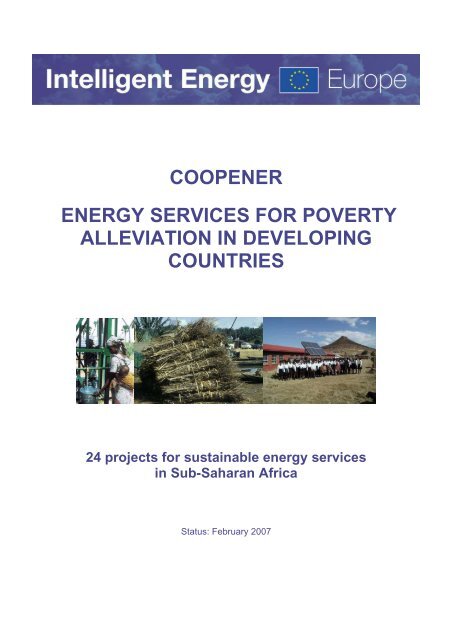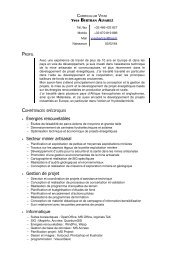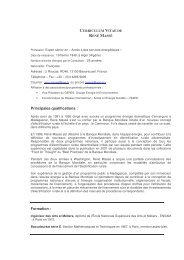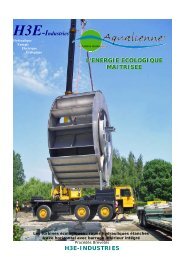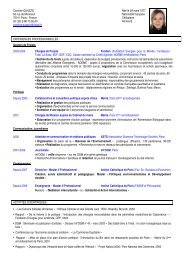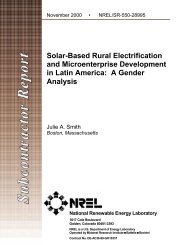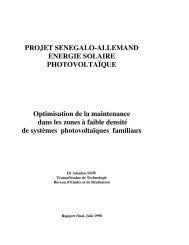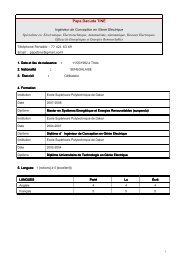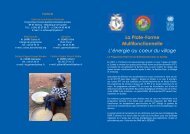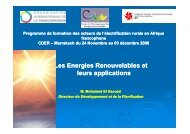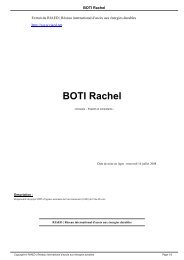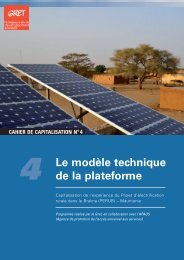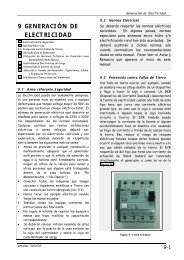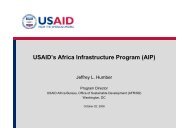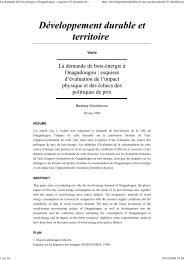Download - RIAED
Download - RIAED
Download - RIAED
Create successful ePaper yourself
Turn your PDF publications into a flip-book with our unique Google optimized e-Paper software.
COOPENERENERGY SERVICES FOR POVERTYALLEVIATION IN DEVELOPINGCOUNTRIES24 projects for sustainable energy servicesin Sub-Saharan AfricaStatus: February 2007
Energy services for poverty alleviation in Sub-Saharan Africa: 24 COOPENER projects supported by the IEE programmeEditorial InformationIssued by the European Commission's Intelligent Energy Executive Agency (IEEA), this report presentsa series of international projects supported by the European Union's Intelligent Energy – Europe (IEE)programme. The information contained in it may be reproduced.The responsibility for the content of this publication lies with its authors. It does not necessarily representthe opinion of the European Community. The IEEA is not responsible for any use that may be made ofthe information contained therein. The information contained is given for information purposes only and itdoes not bind legally any of the involved parties.This and other project compilations can be downloaded for free fromhttp://ec.europa.eu/energy/intelligent/library/publications_en.htm.Intelligent Energy – Europe (IEE) is the European Union’s programme for promoting energy efficiencyand renewables. It supports financially international projects, events, and local/regional energy agencies,which promote the smarter use of energy and the growth of renewable energy sources.The Intelligent Energy Executive Agency implements the IEE programme. With more than 40 staff, theIEEA is at the service of all IEE partners by managing the different projects and events funded under theIEE programme, and by disseminating the know-how and best practices which they produce.More details on the IEE programme and on the IEEA can be found onhttp://ec.europa.eu/energy/intelligent/index_en.htmlCover photographs: © ENEFIBIO, PROVEN, MIRREIRA projects2
Energy services for poverty alleviation in Sub-Saharan Africa: 24 COOPENER projects supported by the IEE programmeTable of contentsIntroduction ...................................................................................................................................................................4Alleviation of Poverty through the Provision of Local Energy Services (APPLES) ......................................................8Biomass Energy Platforms Implementation for Training in Africa (BEPITA)..............................................................10Improved carbonisation and decentralised forestry control in Madagascar (CARAMCODEC)..................................12Development and Energy in Africa (DEA) ..................................................................................................................13Energy Efficiency Training of Trainers (EETT) ...........................................................................................................14Energising the Millennium Development Goals – Setting the Enabling Environment in Southern Africa (E-MINDSET)...................................................................................................................................................................16Building Capacity in Energy in the Health, Education and Water Sectors for Poverty Reduction in sub-SaharanAfrica (ENABLE) .........................................................................................................................................................17Removal of non-technological barriers to encourage SME energy efficiency by the rational use of biomass(ENEFIBIO).................................................................................................................................................................19Energy for Poverty Alleviation in Sahel (IE4Sahel) ....................................................................................................20Improving the economic and social impact of rural electrification (IMPROVES-RE) .................................................21Integrated Southern Africa Business Advisory (INSABA) ..........................................................................................23Mainstreaming Energy for Poverty Reduction and Economic Development (MEPRED)...........................................25Promotion of Microgrids and RES (Renewable Energy Sources) For Electrification in Developing Countries(MICROGRIDS) ..........................................................................................................................................................27Mitigating Risk and Strengthening Capacity for Rural Electricity Investment in Africa (MIRREIA) ............................28Poverty Alleviation through Cleaner Energy from Agro-industries in Africa (PACEAA) .............................................29Poverty Eradication and Planning of Sustainable Energy (PEPSE)...........................................................................31Promoting Renewable Energy in Africa (PREA).........................................................................................................33Proven in rural Africa (PROVEN)................................................................................................................................34Renewable and Efficient Energy for Poverty Alleviation in Southern Africa (REEPASA) ..........................................35Réseau International d’Accès aux Energies Durables (<strong>RIAED</strong>).................................................................................37SIE-Afrique Phase II ...................................................................................................................................................38Sustainable urban renewal: energy efficient building for Africa (SURE-AFRICA)......................................................40Turning Information into Empowerment: Strengthening Gender and Energy networking in Africa (TIE-ENERGIA) 41Tanzanian Renewable Energy and energy Efficiency project to Sustain Poverty Alleviation (TreeSpa)...................433
Energy services for poverty alleviation in Sub-Saharan Africa: 24 COOPENER projects supported by the IEE programmeBackgroundIntroductionCOOPENER is the external component of the EC programme for the promotion of policies, technologies and bestpractices in the fields of renewable energy and energy efficiency, the “Intelligent Energy – Europe programme”.Running from 2003 until the end of 2006, COOPENER addresses the role of sustainable energy for povertyalleviation in developing countries.COOPENER was shaped in the framework of the EU Energy Initiative for Poverty Eradication and SustainableDevelopment (EUEI) decided at the World Summit on Sustainable Development in September 2002. In line withthe EU’s global strategy for sustainable development, in particular the EU contribution to sustainable developmentin the developing world, actions supported under COOPENER are meant to be complementary and upstream ofthe support which is provided in the frame of other community development co-operation programmes. Theconclusions of the Johannesburg summit indeed emphasised the growing realisation, amongst those who areresponsible for development cooperation that a higher priority should be given in future to the role of energy inenabling poverty eradication and sustainable development.COOPENER provides support for strengthening existing capabilities in developing countries so that thoseresponsible are better placed to specify their sustainable energy requirements and to establish appropriate legalframeworks and programmes for sound use of energy resources, as well as financing arrangements to attractinvestment. The Commission ensures close co-ordination and linkage with all relevant initiatives implementedthrough other Community policies and instruments (for example those managed by the Directorates General forDevelopment, External Relations, AIDCO, Environment and the local EU delegations).The COOPENER strand of the IEE programme, like the majority of the IEE programme itself, is mostlyimplemented through grants, responding to a Call for Proposals on an annual basis. Annual Work Programmesprovided information on the priorities and target areas of the respective year. Each call for proposals was focusedon a specific geographical area within the geographical scope of the COOPENER programme (Africa, Central /Latin America, and Asia):Call for ProposalsSub-SaharanAfricaCentral / LatinAmericaSouth-East AsiaTotal ongoing projects(status 02/2007)2003 14 142004 5 4 92005 5 3 5 13Total: 24 7 5 36Table: Number of ongoing projects per Call for proposalsTarget Areas and PrioritiesPriority under COOPENER was given to activities which were focused on the provision of energy services forpoverty alleviation and sustainable development of deprived people in developing countries. COOPENER wasimplemented around two main themes:Energy policies, legislation and market conditions for enabling poverty alleviation in developing countriesto strengthen the existing local capacities in the fields of energy policy and regulations, to assist local, national orregional energy policy makers and regulators to create favourable market conditions for the provision of energyservices;Strengthening local energy expertise in developing countries to promote and support initiatives in developingcountries, which will help to build a critical mass of human capital with up to date knowledge and expertise inenergy policy making, energy regulations, energy planning and project financing.COOPENER projects in Sub-Saharan Africa:The COOPENER projects implemented in Sub-Saharan Africa can be grouped by theme as follows:a) Rural energy in general and rural electrification in particular- Support to rural electrification plans and projects including related capacity building / technology promotionactions: IMPROVES-RE, PEPSE, REEPASA, MICRO GRIDS, PACEEA and PROVEN projects.4
Energy services for poverty alleviation in Sub-Saharan Africa: 24 COOPENER projects supported by the IEE programmeb) Energy for households, biomass and substitutes- Capacity building in the business sector using bio energy and energy efficiency equipment: the ENEFIBIOand TREESPA projects.- Strengthen capacity of key stakeholders in the biomass sector: the BEPITA project.c) Strategies and policies for the sector, both at national and at regional level- Help in developing appropriate energy policies and strengthen capacity of key stakeholders inadministrations: the DEA, SIE-AFRIQUE II, and ENABLE projects.- Support to countries to prioritize energy issues in poverty reduction strategy papers (PRSP) and nationalsustainable energy and development plans: the MEPRED and E-MINDSET projects.d) Capacity building- Promoting the mainstreaming of gender issues into energy policy, planning, programmes: the TIE-ENERGIA- Support to resource centres in energy and development: the APPLES and IE4 SAHEL projects- Networking activities between key energy sector stakeholders: the <strong>RIAED</strong> project gathers African and EUFrench speaking experts involved in electrification projects for the poor within a formal <strong>RIAED</strong> network.This network runs working groups that produce and disseminate reference documents for high leveldiscussions on access to energy for the poor.e) Energy and the academic and private sectors- Attracting commercial investment in sustainable energy projects: the MIRREIA project- Improving energy access for small businesses run in Southern Africa through capacity building andtwinning of RES producers / SME’s : the INSABA project- University twinning activities on low-cost housing and low-cost energy efficiency measures: the PREA andSURE AFRICA projects- Training in energy management in both the public and private sectors: the EETT projectSpecific COOPENER featuresCOOPENER projects are required to demonstrate a concrete demand from the developing country(ies)/regionsconcerned. They also demonstrate a high level of local ownership – each project should be elaborated and, iffunded, performed on the principle of fully shared partnerships between European and local teams from theDeveloping Countries concerned. Cooperation and transfer of experience between developing countries within aproject is highly encouraged. The project teams are composed of European organisations and organisations fromthe country/region concerned. Most COOPENER actions are multi-country or regional activities.Lessons learnt• There is a wide range of capacity building needs in Sub-Saharan Africa; this was identified as a key priority foraction by participants at the Energy for Africa meeting of the European Union’s Energy Initiative for PovertyEradication and Sustainable Development at the United Nations offices in Nairobi (November 2003) 1 . AllCOOPENER projects include capacity building actions, either towards policy makers (for political andregulatory reforms), other market actors or communities.• Projects help policy makers to better understand which role energy can play in improving the lives of poorpeople. Despite that no ACP African country directly addresses energy under the 9th EDF 2 , there is a growingawareness that job creation, food security and improvements in social benefits (clean water, health, andeducation) are all dependent on the provision of modern energy services. The participation of local state orpublic bodies (e.g. energy agencies) in COOPENER projects, which all play a substantial role in projectimplementation 3 , guarantees to some extent local ownership of concepts and practices.1 In the Nairobi recommendations, the 33 participating African countries suggested the following priorities for the EUEI: 1) Ruralenergy in general and rural electrification in particular; 2) Energy for households, biomass and substitutes; 3) Strategies andpolicies for the sector, both at national and at regional level; 4) Capacity building at all levels.2 European Development Fund3 Eligibility criteria for COOPENER proposals’ evaluation5
Energy services for poverty alleviation in Sub-Saharan Africa: 24 COOPENER projects supported by the IEE programme• Local ownership and mobilisation of local capacities has been translated successfully in all activities, thisaspect lying at the very core of the award criteria for successful COOPENER projects. All of the COOPENERprojects involve a well balanced participatory approach, most of them featuring in addition a south-southtransfer of experience and approaches to overcome energy shortages• The appearance of non-energy actors within COOPENER project teams, such as municipalities, chambers ofcommerce, agro-industries demonstrate that the need for these issues to be tackled by the end-use sectorsdirectly has been successfully conveyed• Activities related to access and regulatory environments (energy policies) are and must still be prioritised in thefuture. Indeed the establishment of transparent regulatory structures, pricing policies, subsidy levels, technicalregulations, etc. are key conditions for the emergence of (public and/or private) local capacities for thedevelopment and monitoring of projects targeted on the supply of energy services;• Experts “in the field” remind that improved access to energy is an essential input along with other infrastructuredevelopments, such as water supply, roads, schools and health centres.• There is a general lack of energy & development experts both in the EU and locally which requires long termactions and efforts to enlarge the energy community both in Europe and Africa;• COOPENER applicants have been successful in getting African regional organisations or networks involved inprojects.OutlookThe European Commission presented seven new thematic programmes in the context of the Community externalactions for the period 2007 to 2013. One of these thematic programmes 4 covers energy cooperation withdeveloping countries and ensures continuity with the previous COOPENER programme. This programme shouldbe operational in 2007 for a period of 7 years.Further information and links:• Fact Sheets of COOPENER projects: http://ec.europa.eu/energy/intelligent/projects/coopener_en.htm• European Union Energy Initiative: http://ec.europa.eu/development/body/theme/energy/initiative/index_en.htm• ACP-EC Energy Facility: http://ec.europa.eu/development/body/theme/energy/initiative/index_en.htm• Thematic Programme for Environment and Sustainable Management of Natural Resources including Energy:http://ec.europa.eu/development/body/theme/environment/ENRTP.htm4 Thematic Programme for Environment and Sustainable Management of Natural Resources including Energy6
Energy services for poverty alleviation in Sub-Saharan Africa: 24 COOPENER projects supported by the IEE programmeAnnex 1 - COOPENER geographical mapping – projects in Sub-Saharan AfricaBeninBurkina FasoCape VerdeGhanaGuineaGuinea-BissauIvory CoastLiberiaMaliMauritaniaNigerNigeriaSaint HelenaSenegalSierra LeoneThe GambiaTogoBurundiComorosDjiboutiEritreaEthiopiaKenyaMadagascarMalawiMauritiusMayotteMozambiqueRéunionRwandaSeychellesSomaliaSudanUgandaUnited Rep. of TanzaniaZambiaZimbabweAngolaCameroonCentral African RepublicChadCongoDem. Rep. of the CongoEquatorial GuineaGabonSao Tome and PrincipeBotswanaLesothoNamibiaSouth AfricaSwazilandProject N° Project AcronymWestern Africa Eastern Africa Central Africa Southern A.EIE-04-004 PEPSE •EIE-04-032 BEPITA • •EIE-04-034 MIRREIA • • •EIE-04-094 INSABA • • • •EIE-04-099 ENABLE • • • •EIE-04-129 ENEFIBIO • •EIE-04-131 IE4Sahel • • • • • • • • •EIE-04-133 IMPROVES-RE • • • • •EIE-04-166 PROVEN • • • • • •EIE-04-168 APPLES •EIE-04-198 TIE-ENERGIA • • • • • • • • • • • •EIE-04-201 DEA • • • • • •EIE-04-236 SIE-Afrique Phase II • • •EIE-04-243 MEPRED • • • •EIE-05-011 MICROGRIDS •EIE-05-046 REEPASA • • • •EIE-05-061 <strong>RIAED</strong> • • • • • • • • • • • • • • • •EIE-05-121 PREA • • •EIE-05-215 EETT • • • •EIE-06-244 CARAMCODEC •EIE-06-247 PACEAA • • • • • • • • • • •EIE-06-250 E-MINDSET • • • •EIE-06-274 Sure-Africa • • •EIE-06-278 TreeSpa •7
Energy services for poverty alleviation in Sub-Saharan Africa: 24 COOPENER projects supported by the IEE programmeAlleviation of Poverty through the Provision of Local Energy Services(APPLES)Programme area:Target countries:Status:Coordinator:Partners:Website:Objective:Benefits:Keywords:COOPENER, Strengthening local energy expertise in developingcountriesSouth AfricaongoingNico van der LindenEnergy research Centre of the Netherlands(ECN)n.vanderlinden@ecn.nlTel: +31 (0)22456 4433ERC, University of Cape Town, South AfricaParallax, South AfricaRisoe, DenmarkECI, University of Oxford, United Kingdomhttp://applesonline.infoTo build energy services capacity within poorer communities in SouthAfricaimproved access to modern energy for poor people; incomegenerating economic activities, job creationenergy service provision, best energy practice, strengthening energycentresDuration: 06/2005 –02/2008Budget: €815,947 (EU contribution: 50%)Contract number: EIE/04/168/S07.40686Short descriptionThe APPLES project aims to find a sustainable mechanism for the effective delivery of improved local energyservices to poor communities in South Africa by contributing to the establishment and strengthening of existingenergy centers.The project has identified four locations for targeted action: Highflats in Kwazulu Natal Province, Hluleka in EasternCape Province, Buffalo City in Eastern Cape Province and Cape Town. For each location, the following activitieswill be implemented:• needs assessment: establish energy-related priorities of poor people• Best Practice: Identify and demonstrate best practices for energy services provision• Capacity Building: beneficiaries include end-users in poor communities, local entrepreneurs, government andthe private sector.• Monitoring and evaluation of the impacts of APPLES: evaluating the lessons learned to enable results to bewidely replicatedExpected and/or achieved results• energy priorities in the selected locations will be assessed through a consultative process which will raise theawareness of end users and lead to more rational choices over affordable, clean and efficient energy supplies.• best practices for the provision of energy services that address the identified energy needs will be determinedand demonstrated• establishment and/or strengthening of energy services centres in the selected locations and demonstration of amodel for alleviation of poverty through the provision of local energy services that an be replicated wildly.8
Energy services for poverty alleviation in Sub-Saharan Africa: 24 COOPENER projects supported by the IEE programmeLessons learntDuring the preparation of the APPLES project proposal, potential donors have been identified who expressed theirwillingness to provide the necessary co-financing for the local partners. However, shortly after the contract with theEuropean Commission was signed the attitude of some of the donors towards co-operation with the APPLESproject changed and the requirements for co-financing had to be re-negotiated. This resulted in a significant delayin the implementation of the project. The lesson to be learnt from this experience is that first a firm commitment(preferably in writing) from the donors is required before a full project proposal can be developed and submitted.9
Energy services for poverty alleviation in Sub-Saharan Africa: 24 COOPENER projects supported by the IEE programmeBiomass Energy Platforms Implementation for Training in Africa(BEPITA)Programme area:Target countries:Status:Coordinator:Partners:Website:Objective:Benefits:Keywords:COOPENER, Strengthening local energy expertise in developingcountriesThe none limited associated countries are: Burkina Faso, Cameroon,Senegal, Gambia, Guinea Bissau, Guinea, Benin, Mali, Niger, Chad,Gabon, Congo, Democratic Republic of the Congo, Ivory coast,Central African Republic.ongoingPhilippe GIRARDCIRAD (French Agricultural Research Centre for InternationalDevelopment); FranceE-mail: philippe.girard@cirad.frTel : + 33 (4) 67 61 44 75Université Catholique de Louvain (UCL); BelgiumGroupement des ecoles EIER-ETSHER; Burkina FasoIsome ; Burkina FasoEcole Nationale Supérieure Polytechnique, Camerounhttp://www.bepita.netEstablishing perennials training platforms for biomass-energytechnologies in AFRICAStrengthening local energy expertise and Developing energyproduction capacity in Africabiomass energy, training and networkingBEPITADuration: 01/01/2005 – 31/12/2007Budget: € 530,755 (EU contribution: 45.93%)Contract number: EIE/04/032/S07.38611Short descriptionBEPITA establishes perennial specialised training platforms for biomass technologies covering two wide regions inSub-Saharan Africa: the “dry zone” and the “wetland zone”, each of them having specific energy needs andpotentials as the quantities of biomass available and processes used differ. The platforms will inventory, classifyand organise global educational packages covering the entire biomass energy chain and focus on targeted groups.Platforms would be based in Burkina Faso (“dry zone” base) and Cameroon (“wetland zone” base), within thepremises of the BEPITA partners, and clustering a wide range of training activities and services undertaken byexperienced actors in training with:• Short term benefit by organising training sessions and workshops for policy makers and private sectorrepresentatives with particular attention devoted to transfer of technologies• Long term benefit by reinforcing master level and post graduates as well as professors.Expected and/or achieved results• Targeted training sessions (for private sector, public sector and professional organisations/NGO sector)organised within countries located in the “dry zone” and “wetland zone” base platforms.• Training course session for students/teachers in high schools, university and technical institutes.• Directories that contains information about expert organisations and professionals that are qualified to work inthe field of energy production, with an emphasis on biomass, and a list presenting the geographical distributionof the demonstration installations in the two regions ( “dry zone” and the “wetland zone”)• Regional forums/workshops (in the “dry zone” and the “wetland zone”) focused on mature technologiesadapted to energy production from the various biomasses sources available in Africa.• New projects using biomass technologies developed in Africa10
Energy services for poverty alleviation in Sub-Saharan Africa: 24 COOPENER projects supported by the IEE programmeLessons learntAlthough the project is not yet completed it gives rise to the following preliminary conclusions:• Biomass is already largely used in Africa for domestic applications. However there are numerous industrialapplications which are not sufficiently known.• The interest for Biomass energy is growing considerably with a demand which also concern direct substitutionto diesel for transport and standard electric power generation application.• The demand for capacity building is larger than BEPITA capability.11
Energy services for poverty alleviation in Sub-Saharan Africa: 24 COOPENER projects supported by the IEE programmeImproved carbonisation and decentralised forestry control in Madagascar(CARAMCODEC)Programme area:Target countries:Status:Coordinator:Partners:Website:Objective:Benefits:COOPENERMadagascarongoingMr Pierre MontagneCIRAD - Centre de Coopération Internationale en RechercheAgronomique pour le Développement, FranceE-mail: pierre.montagne@cirad.frTel: + 261 32 07 169 60Centre Wallon de Recherches, BelgiumPARTAGE, MadagascarFOFIFA, Madagascar(under construction)Efficient use of forest supply and charcoal in MadagascarSustainable use of local energy resources and improved incomegenerationKeywords:Charcoal production, sustainable management of local resources,income generationDuration: 01/2007 – 12/2008Budget: € 830.177 (EU contribution: 50%)Contract number: EIE/06/244/SI2.449538Short descriptionTo the west of Madagascar,in the Boeny area, forests are exploited to supply wood and charcoal to urban populations ofMahajanga town who cannot possibly buy other energy sources as fuel or gas. In consequence, the Boeny forests decreasewithout any management of a wood fuel supply compatible with natural regeneration.At local and regional levels, interventions proposed by the project will aim at increasing rural incomes derived from energy woodin order to alleviate rural poverty, through trainings. At the same time, the project will support sustained energy supply (mostlycharcoal) to the town of Mahajanga so as to ensure continuous satisfaction of the domestic needs of its inhabitants. The actionscomprise the training of rural councils and charcoal makers to improve carbonization, to include this activity into the formalsector and to promote local control. In parallel, the project will organise of a collective review between all the actors of the woodenergy sector to propose an institutional plan the can be adapted to the urban areas with constraints of local energy supply.At national level, accordingly with national forest service, the action intends to improve the implementation of the nationalenergy policy on fiscal schemes. Based on local and regional experience of Mahajanga, the aim is to develop in all Madagascarthe same system of control of charcoal flows at decentralised level.A national workshop will be organized by the civil authorities (Energy, Environment, Forestry commission and Decentralization)proposing solutions to adapt wood energy taxation and forestry control to the areas with constraints of urban supply in domesticenergy.Expected and/or achieved results• Training of charcoal producers will increase carbonization efficiency by 10 to 20% and improve their living conditions• Kick-off of a review process for the civil administrations (Energy, Environment, Forestry Commission and Decentralisation)to implement realistic solutions for forestry taxation on wood fuel and for forestry control• Support new regulations (incentive tax policy and forest control joining together territorial authorities and forestry services)in urban areas lacking local energy supply.Lessons learntThis project has just started. It is therefore too early to draw lessons.12
Energy services for poverty alleviation in Sub-Saharan Africa: 24 COOPENER projects supported by the IEE programmeDevelopment and Energy in Africa (DEA)Programme area:Target countries:Status:Coordinator:Partners:Website:Objective:Benefits:Keywords:COOPENER, Community cooperation with developing countriesBotswana, Ghana, Mali, Senegal, Tanzania, ZambiaongoingGordon MackenzieEnergy for Development, Risø National Laboratory, DenmarkE-mail: gordon.mackenzie@risoe.dkTel: +45 4677 5171ECN, NetherlandsEECG, BotswanaKITE, GhanaMali Folkecenter, MaliENDA, SenegalTaTEDO, TanzaniaCEEEZ, Zambiahttp://www.deafrica.netDevelopment and application of a method to assess the developmentimpacts of energy interventions.Information obtained will lead to enhance development impacts offuture energy projects.development, impact, assessmentDEADevelopment andEnergy in AfricaDuration: 05/2005 – 10/2007Budget: € 0.651 million (EU contribution: 50%)Contract number: EIE/04/201/S07.40687Short descriptionDEA is developing an Assessment Framework to identify and quantify the outcomes and impacts of energyprojects. Working with centres in six Sub-Saharan Africa countries (Botswana, Ghana, Mali, Senegal, Tanzaniaand Zambia), the project will use the framework in case studies of real energy projects.Access to energy is an essential input in the process of development and poverty alleviation. Better understandingof development-poverty-energy linkages, and embodiment of this knowledge in an operational tool, can lead toenergy interventions which have higher development and poverty alleviation outcomes. Specific energy projectsare examined with respect to their outcomes and impacts, and a methodological framework developed to feedresults back into the conception and design of new projects. The Project is aimed at national energy- anddevelopment-policy makers, initially in the six participating African countries, but with a view to wider application inSub-Saharan Africa.Expected and/or achieved results• a proven and demonstrated evaluation methodology with real case study examples• a catalogue of small and medium-sized energy interventions in the six countries• a survey of literature on impact assessment of energy projects• a participatory approach to identify impact indicators at the local level• enhanced capacity in countries for assessing impacts of energy projects• enhanced awareness among stakeholders of how energy access contributes to developmentLessons learntAlthough the project is not yet completed it gives rise to the following preliminary conclusions:• Energy projects can have significant developmental impacts, but attribution is difficult because of othersimultaneous factors.• Improved energy access is an essential input along with other infrastructure developments, such as watersupply, roads, schools and health centres,• Awareness among stakeholders of the importance of energy access can be enhanced by working togetheracross sectors to examine the outcomes and developmental impacts of energy projects.13
Energy services for poverty alleviation in Sub-Saharan Africa: 24 COOPENER projects supported by the IEE programmeEnergy Efficiency Training of Trainers (EETT)Programme area:Status:Coordinator:Partners:Website:Objective:Benefits:Keywords:COOPENER, local energy expertiseongoingRainer BehnkeMVV Consulting GmbHGermanyE-mail: r.behnke@mvv-consulting.comPhone: +49-30-885 760 12Institute of Systems and RoboticsUniversity of Coimbra, Department of Electrical Engineering, Portugalwww.eett.infoTo build capacity on energy management by training of trainers onenergy managementBasis to develop of regional Energy Management Training Centres isestablishedCapacity building, energy manager training, training centresDuration: 01/2006 – 12/2007Budget: € 581,219 (EU contribution: 50 %)Contract number: EIE/05/215/SI2.420253Short descriptionPresentation of certificatesSao Tome, August 2006Group of traineesSao Tome, August 2006The purpose of the project is to build capacities through the set- up of asustainable training system for skilled human resources in the area ofenergy management in four sub-Saharan Portuguese-speaking Africancountries: Angola, Cabo Verde, Mozambique and Sao Tome è Principe.The training programme provides structured training and training materialto facilitate a training system in energy management in both the public andprivate sectors. Subjects of the training courses are:• Introduction, methodology• Development of energy efficiency strategies and master plans• Energy management in buildings• Energy management in industry• Energy audits• Renewable energies• Financing of energy efficiency• Methods of project development• Energy management training centres/ Energy AgenciesThe courses focus on the transfer of know-how and skills necessary toindependently initiate and carry out no-cost/low-cost energy managementactivities and to further transfer and disseminate the knowledge gained.14
Energy services for poverty alleviation in Sub-Saharan Africa: 24 COOPENER projects supported by the IEE programmeExpected and/or achieved results• Local availability of practical energy know-how and increased environmental awareness, which willsubsequently increase and support management action to improve energy efficiency in different areas of theeconomy of the target countries.• Training of trainers programme, implemented by nine one-day training modules in each target country.• Plans for the continuation of the training courses under local guidance (by the participating subcontractors,such as local education institutes) are under development in order to ensure the sustainability of the results ofthe EETT project.• Networking activities aiming to disseminate the approach and methodology of EETT to other sub-SaharanAfrican countries.Lessons learntAlthough the project has not been completed it is possible to draw the following preliminary conclusions:• The process of the preparation of the training sessions is difficult and very time consuming. This mainly relatesto the organisation of the training events, the identification of the trainees and the specification of their needs.• The integration of many practical elements and case studies into the training courses in combination with thehigh motivation of trainees makes the training events itself very successful.• Existing education institutions in Cape Verde, Sao Tome and Angola announced the interest to utilise theresults of EETT as basis for implementation of Energy Management Courses in university/ professional or highschool education.15
Energy services for poverty alleviation in Sub-Saharan Africa: 24 COOPENER projects supported by the IEE programmeEnergising the Millennium Development Goals – Setting the EnablingEnvironment in Southern Africa (E-MINDSET)Programme area:Target countries:Status:Coordinator:Partners:Website:Objective:Benefits:Keywords:COOPENERMalawi, Mozambique, Zambia, ZimbabweOn-goingMr. Tinashe Darlington NhetePractical Action Southern Africa, ZimbabweE-mail: tinashen@practicalaction.org.zwTel: + 263 4 776631Practical Action, United Kingdom & ZimbabweUniversity of Twente, NetherlandsMulanje Mountain Conservancy Trust, MMCT, MalawiEnergy and Environment Concerns for Zambia, EECZ, ZambiaSouthern Centre for Energy and Environment SCEE, ZimbabweUnder constructionE-Mindset aims at bridging the gap between national and local energyplanning, allowing a cross-sectoral integration of energy.Local agents and planners trained; increased awarenessLocal energy planning, cross-sectoral energy integration, trainingDuration:01/01/2007 – 31/12/2009 (36 months)Budget: € 869,308 (EU contribution: 50%)Contract number: EIE/06/250/SI2.449314Short descriptionE-Mindset addresses the gap between central, national energy policy, planning and implementation and local leveldevelopment planning. It aims at strengthening the cross-sectoral linkages between energy and common localservices such as health, agriculture and environment, with the overall objective to give energy a higher emphasis inthe achievement of national MDG targets.The project will develop tools to be used at the local planning level to link energy issues and poverty reduction inSouthern Africa. Some of its specific objectives are to: (a) develop toolkits that will strengthen partners' andcommunities’ capacity in linking energy planning and development; (b) increase awareness on clean alternativeenergy options for rural communities; (b) influence the policy and regulatory framework to highlight energyrequirements in the achievement of MDG targets.Expected and/or achieved results• Increased district level capacity to link energy planning and poverty reduction (more than 70% ofparticipating districts will have an energy focal point by end of the project, 100 extension workers trained astrainers in village level energy planning by 2010, 12 district energy strategies developed by end of project).• Increased awareness of local planners and communities on energy integration in other sectors• Influence on policy & regulatory framework to reflect the importance of energy in the national MDG targets.Lessons learntThis project has just started. It is therefore too early to draw lessons.16
Energy services for poverty alleviation in Sub-Saharan Africa: 24 COOPENER projects supported by the IEE programmeBuilding Capacity in Energy in the Health, Education and Water Sectors forPoverty Reduction in sub-Saharan Africa (ENABLE)Programme area:Target countries:Status:Coordinator:Partners:Website:Objective:Benefits:Keywords:COOPENER, strengthening local energy expertise in developingcountriesKenya, Tanzania, Uganda, SenegalOngoingKaterina SyngellakisIT Power, United KingdomE-mail: katerina.syngellakis@itpower.co.ukTel. +44 1256 392739Stockholm Environment Institute, SwedenTransénergie, FranceIT Power East Africa, KenyaTanzania Traditional Energy Development and EnvironmentOrganisation, TanzaniaRural Electrification Agency of Senegal (ASER), SenegalQuinTsens, Senegalhttp://www.enable.nuDevelop awareness of renewable energy use for poverty reduction inthe health, education and water sectorsSupport of the EU Energy Initiative and of Millennium DevelopmentGoals in the health, education and water sectorsRenewable Energy, Water, Health, Education, Poverty ReductionDuration: 01/2005 – 06/2007Budget: € 1159686 (EU contribution: 50%)Contract number: EIE/04/099/S07.38620Short descriptionENABLE supports the governmental sectors of education, water and health in Tanzania, Uganda and Kenya bybuilding policy and planning capacity amongst ministry and local government staff regarding the role thatrenewable energy technologies can play in meeting sector goals.Capacity building and awareness raising are being delivered through a series of workshops and training activities.First national workshops were completed in late 2005 and a regional workshop in Tanzania in March 2006produced a wide range of concrete actions that need to be taken to accelerate energy access in East Africa.Other activities of ENABLE include the development of Energy Guidelines and Packages for health, water andeducation, the development of an Electrification Planning Tool to assist in selection of technologies according tocost and economic benefits, provision of training on the energy guidelines and planning tool and development of areplication package for francophone Africa, initially focusing on Senegal.Expected and/or achieved results• Support with relation to energy to government staff in Uganda, Tanzania and Kenya. In particular, through itsregional workshop, ENABLE provided support in the formulation of a work plan for the East African CommunityEnergy Committee to take forward its Strategy for Scale-Up of Energy Services in East Africa.• Energy Guidelines and Packages to assist planning at the central and local government level in the sectors ofhealth, water and education.• An Electrification Planning Tool to assist in the selection of suitable areas for off-grid electrification and to assistin the selection of appropriate technologies on a cost and economic benefit basis. This tool will be particularlyuseful for local government staff.• Training will be provided to central and local government staff on the tools produced during the project, toensure good take –up and use of the tools. Ultimately, the project aims to help create stronger and morecapable institutions in the energy, health, education and water sectors.• At a wider level, the project expects to help increase transparency in the decision-making process, facilitatemore co-ordinated, strategic approach to energy provision and encourage a more sustainable approach to theuse of renewable energy.17
Energy services for poverty alleviation in Sub-Saharan Africa: 24 COOPENER projects supported by the IEE programmeLessons learntAlthough the ENABLE project is not yet completed it gives rise to the following preliminary conclusions which applyto all of the studied countries (Uganda, Kenya and Tanzania):• There is not enough involvement and not enough knowledge available at the district level in terms of planningfor energy service delivery.• The availability of comprehensive, accurate and critical information on energy resources, demand, utilisationand technologies is missing or incomplete in most regions.• At the moment there is limited cooperation between sectors for coordinated planning for energy integration.Linkages between sectors are not always well understood and limited resources have curbed attempts toundertake integrated and holistic energy planning.18
Energy services for poverty alleviation in Sub-Saharan Africa: 24 COOPENER projects supported by the IEE programmeRemoval of non-technological barriers to encourage SME energy efficiencyby the rational use of biomass (ENEFIBIO)Programme area:Target countries:Status:Coordinator:Partners:Website:Objective:Benefits:Keywords:COOPENER, strengthening local energy expertise & energy policyand legislation conditions in developing countriesSenegal & CameroonOngoingYves SCHENKELCRA-W, BelgiumE-mail: schenkel@cra.wallonie.beTel: +32 (0)81 627 148ITEBE, FranceERA-Cameroun, CameroonENDA-Tiers Monde, SenegalADG, Belgiumhttp://www.enefibio.comTo develop a favourable framework for bioenergy projectsdevelopment in SMEsFossil fuel replacement, SMEs energy efficiency, activities in ruralareasBioenergy, SME, trainingDuration: 07/2005 – 12/2007Budget: € 905 956 (EU contribution: 50%)Contract number: EIE/04/129/S07.40676Short descriptionThe ENEFIBIO project helps creating a favourable framework for bioenergy projects development in Senegaleseand Cameroonian SMEs. It promotes the use of biomass (residues from agro-food and wood-processing industries,etc.) to produce heat and/or power with efficient technologies. Emphasis is given to energy production within SMEsto provide them with the energy services required for their processes.The non-technological barriers to the development of bioenergy projects are addressed through:• the stimulation of dialogue between policy-makers and SME entrepreneurs regarding policy frameworks• the training of project developers on how to conduct pre-feasibility and feasibility studies and on projectdevelopment methodology• the development of tools to assist project developers (guidelines etc.)• the development of tools to inform SME entrepreneurs on the potential of energy improvement in theircompanies with adapted bioenergy technologies.Expected and/or achieved results• To put on the market persons able to push SME bioenergy projects from idea to financing and implementation• To set up an information centre in Senegal and in Cameroun to stimulate bioenergy projects development inSMEs• To suggest concrete recommendations to improve policy frameworks in order to stimulate investments inbioenergyLessons learntAt this stage, the lessons learnt are:• Awareness of SME entrepreneurs regarding the role of energy in the company efficiency is increasing.• The definition of a SME differs not only between Senegal to Cameroun, but also from the EC definition. Thecriteria are usually based on the annual turnover and the number of employees, which can hardly be knownprecisely.• Few data exist on SMEs energy consumption, except for traditional sectors such as sugar and palm oilindustries. SME managers do not have a clear idea of their energy consumption.19
Energy services for poverty alleviation in Sub-Saharan Africa: 24 COOPENER projects supported by the IEE programmeEnergy for Poverty Alleviation in Sahel (IE4Sahel)Programme area:Target countries:Status:Coordinator:Partners:Website:Objective:Benefits:Keywords:COOPENER, Cooperation with Developing CountriesBurkina Faso, Cape Verde, Chad, Guinea Bissau, Mali, Mauritania,Niger, Senegal, The GambiaOngoingLuis AlvesResearch Group on Energy and Sustainable DevelopmentInstituto Superior Tecnico, PortugalE-mail: lalves@navier.ist.utl.ptTel: +351218417372Energy for Sustainable Development ltd, UKCenter for Renewable Energy Sources, GreeceARC - Centre Regional AGRHYMET - Nigerhttp://ie4sahel.energyprojects.netCreate and strengthen a Regional Reference Centre for Energy andPoverty in Sahel.A well established centre for capacity building of local humanresources can ensure long-lasting effects.Energy, Poverty, SahelDuration: 04/2005 – 04/2007Budget: € 738,295 (EU contribution: 50%)Contract number: EIE/04/131/S07.40673Short descriptionThe goal of the project is to strengthen the capacity of a well-established research and training centre in thedomain of energy and on its role to combat poverty. In particular the following activities are being implemented:• inventory of energy stakeholders;• assessment of current energy policies and regulations;• assessment of potential energy sources and appropriate low cost technologies;• implementation of training courses for the trainers at ARC;• facilitating the communication of scientific and policy information in the region on energy and poverty;• networking and advocating activities on the role of energy for poverty reduction.Expected and/or achieved results• Implementation of energy related courses and activities in the Aghrymeth Centre• Formulation of sustainable and pro-poor energy policies in the Sahel region• Raising the awareness of policy makers and energy stakeholders on the role of energy to combat poverty.Lessons learntThe project activities has already created an effective network of stakeholder in energy and poverty issues in theregion and put in the agenda of the CILSS, most important regional organisation in Sahel, those issues. Although itis very difficult to gather information in this African region, the project has already accomplished a great deal ofwork in assessing and treating pertinent data and information for policy makers in energy and poverty alleviatedrelated issues.20
Energy services for poverty alleviation in Sub-Saharan Africa: 24 COOPENER projects supported by the IEE programmeImproving the economic and social impact of rural electrification(IMPROVES-RE)Programme area:Target countries:Status:Coordinator:Partners:Website:Objective:Benefits:Keywords:COOPENER, main key actionBurkina Faso, Cameroon, Mali, NigerOngoingDenis RAMBAUD-MEASSONIED, FranceE-mail: d.rambaudmeasson@ied-sa.frTel: +33.4.72.59.13.20ETC, NetherlandsRISOE, Denmarkhttp://www.improves-re.comReinforce the impact of rural electrification programmes onsustainable development and poverty reductionintegrated planning approach that takes into account synergiesbetween social services and rural electrificationRural electrification, integrated planning, synergiesIMPROVES-REImproving Economic and Socialimpact of Rural El ect rificat ionDuration: 04/2005 – 03/2007Budget: 1,042,303 € (EU contribution: 50%)Contract number: EIE/04/133/S07.40682Short descriptionUsing the functionalities of Geographical Information Systems IMPROVES-RE formulates an integrated planningapproach in Burkina Faso, Cameroon, Mali and Niger that takes into account (i) the range of renewable energytechnologies available for power generation and (ii) synergy with other infrastructure developments (health,education, drinking water, ITC’s…) or the development of income generating activities to achieve maximumdevelopment impact.To demonstrate the approach, local rural electrification plans will be formulated in selected areas with 200,000inhabitants, in association with the local actors (NGOs, local communities, individuals…) who may be involved inproviding electric service in the area. National and decentralized actors in charge of rural electrification investmentplanning will be trained and the tools and know-how built by the project will be disseminated between theparticipating countries, and with an extended circle of African countries.Expected and/or achieved results• Integrated planning tools and methodologies in the 4 countries, discussed and validated by key infrastructuredevelopment stakeholders (health, education, drinking water, ITC’s…)• Local rural electrification plans in pilot zones, discussed and validated with the local stakeholders.• Online pilot tool in one country for disseminating information on rural electrification service expansion and crosssectoral synergies, which uses the functionalities of Geographical Information Systems (GIS)21
Energy services for poverty alleviation in Sub-Saharan Africa: 24 COOPENER projects supported by the IEE programmeLessons learntAlthough the project has not been completed it is possible to draw the following preliminary conclusions:• Building a new type of public-private partnershipIMPROVES-RE builds upon a new type of public-private partnership, far from the traditional customer-bidder.This new situation may result in misunderstanding for sensitive subjects such as the selection of the pilot zoneand morel exchanges between the parties involved.• Creating national multi-sector dynamicIMPROVES-RE plays a significant role in the establishment of Multi-sector National Committees, in charge ofimproving dialogue and partnership between national stakeholders to foster access to energy services. MultisectorNational Working groups gather more than 15 government departments, specialized Agencies andInstitutions. These working groups constitute a first and significant step toward stronger harmonisation ofInvestments in the countries. But the durability of these multi-sector groups remains uncertain.• Strengthening national expertiseAlthough all capacity building activities scheduled in the projects have been carried out, the interest raised bythe approach imply additional efforts to ensure that not only local subcontractors and national counterparts butalso stakeholders from other sectors have the required level of expertise to use and update the GIS.22
Energy services for poverty alleviation in Sub-Saharan Africa: 24 COOPENER projects supported by the IEE programmeIntegrated Southern Africa Business Advisory (INSABA)Programme area:Target countries:Status:Coordinator:Partners:Website:Objective:Benefits:Keywords:COOPENER, Strengthening local energy expertise in developingcountriesBotswana, Namibia, Republic of South Africa, ZambiaOngoingKlaus KNECHTInWEnt,GermanyE-mail: klaus.knecht@inwent.orgTel: +49-(0)30-25482110Adelphi Research, GermanyCentric Austria International, AustriaNordic Folkecenter for Renewable Energy, DenmarkBotswana Technology Center, BotswanaSolarAge, NamibiaOneWorld Sustainable Investments, South AfricaCentre for Energy, Environment and Engineering Zambia, Zambiahttp://www.insaba.orgPromoting productive use of renewable energy through identificationof marketable goods/services and business adviceJob creation, poverty alleviation, SME support, new markets foradvanced adapted technologies,Renewable energies, Productive use, market analysisDuration: 04/2005 – 09-2007Budget: € 615,598 (EU contribution: 50%)Contract number: EIE/04/094/S.07.40675Short descriptionINSABA develops and delivers adapted tools to identify marketable goods and services which can be producedwith different locally available renewable energy sources. The 30 months project includes training, businessadvisory and policy dialogue interventions in Botswana, Namibia, RSA and Zambia. Interdisciplinary AdvisoryTeams will be established in pilot regions of the target countries to support SME in producing and marketing goodsand services with the use of RET - whereas energy services are considered as being part of production costs andshall be covered from sales revenues.These activities will be complemented by supporting local SME that supply renewable energy technologies,systems and services. Matchmaking events will bring together providers and users of renewable energy and alsogive European renewables suppliers a chance to meet customers or cooperation partners. In addition, relevantlegal frameworks will be reviewed together with representatives of the four target countries’ governments and otherdecision makers.Expected and/or achieved results• Business Advice, Training, Coaching:Demand Side: Interdisciplinary advisory teams (IATs) are set up in pilot regions. African project partners andIATs will be enabled to train, advise and coach producers/suppliers of goods and services - with support fromthe European project partners.Supply Side: Local SME providing RE technology and services receive advanced training in RE-technologiesand business management.• Market analyses undertaken in course of the project will verify whether goods and services produced in higherquality or quantity with energy from renewable energy systems are actually marketable in a way that therevenue covers the energy costs.• Matchmaking events bringing RE providers and users together are expected to drive a process leading tosystem designs and energy services that are better adapted to the specific needs of the users.• Policy dialogue by round-table consultations with representatives of the four target countries’ governments andother decision makers are expected to improve legal frameworks for promotion of RE and SME.23
Energy services for poverty alleviation in Sub-Saharan Africa: 24 COOPENER projects supported by the IEE programmeLessons learntAlthough the project is not yet completed it gives rise to the following preliminary conclusions:• It is challenging to manage the change from the “traditional” technology-driven approach towards a moredemand-driven approach that focuses on productive use of RE in rural and urban areas.• Differing political and socio-economic framework conditions require that the project team takes a differentapproach in each of the four target countries.24
Energy services for poverty alleviation in Sub-Saharan Africa: 24 COOPENER projects supported by the IEE programmeMainstreaming Energy for Poverty Reduction and Economic Development(MEPRED)Programme area:Target countries:Status:COOPENERBurkina Faso, Mali, Niger, Senegal and ECOWAS regionongoingCoordinator: Michel HamelinADEME, Francemichel.hamelin@ademe.fr331.4765.2450Partners: • Direction général de l'énergie, Burkina Faso• Direction de l'énergie, Mali• Ministre des Mines et de l'Energie, Comité National Multisectoriel,Niger• Direction de l'énergie, Sénégal• ECOWAS, Western Africa regional organisation• ADEME, France• Danida, Denmark• GTZ, Germany• SenterNovem, NetherlandsWebsite:http://www.mepred.euObjective:Benefits:Keywords:Mainstream access to energy into national development policies andstrategiesIncrease support from public authorities, North and South, to energyaccess programmes aimed at poverty reduction and sustainabledevelopment."Access to energy", "national development strategies"Duration: 04/2005 – 04-2008Budget: 2 227 000€ (EU contribution: 41%)Contract number:Short descriptionThe MEPRED project, part of the European Energy Initiative, aims at laying the groundwork for broader access toenergy. MEPRED will apply a multi-stakeholder multi-sector approach in order to mainstream energy for povertyreduction and economic and social development into national and regional development strategies andprogrammes.This approach aims to lay the foundation for bringing public support, both from developing country publicauthorities and from developed country aid agencies, to projects and programmes delivering essential energyservices essential.Burkina Faso, Mali, Niger, Senegal and ECOWAS participate in MEPRED. Support comes from the EuropeanCommission Coopener programme, Denmark, France, Germany and the Netherlands, along with the UNDPEnergy/Poverty Regional Programme. MEPRED cooperates with the World Bank/ESMAP and GVEP.25
Energy services for poverty alleviation in Sub-Saharan Africa: 24 COOPENER projects supported by the IEE programmeExpected and/or achieved resultsThrough the participation of private and public stakeholders, the project aims to:• Identify energy services essential for achieving the Millennium DevelopmentGoals, in areas such as water, health, education, gender equality, ruraldevelopment, etc.• Make propositions for integrating energy into development strategies.• Develop economic and financial models for energy service delivery.• Propose institutional actions for using local sustainable energy resources(notably biomass and hydropower).• Develop institutional mechanisms to assure that energy meets the needs of poverty eradication and nationaldevelopment.• Train and build capacity for these activities.Lessons learntAlthough the project is not yet completed it gives rise to the following preliminary conclusions:• In order to be effective, the activities of institutional support projects must be based on consultation, at everystep of the way, with the national and local public authorities of the beneficiary country. This is the only way toguarantee ownership and long term sustainability of results.• Partners in COOPENER projects must pay attention to the complex inter-relationship between, on the onehand ODA rules and practices, and on the other hand, Intelligent Energy Europe administrative rules.26
Energy services for poverty alleviation in Sub-Saharan Africa: 24 COOPENER projects supported by the IEE programmePromotion of Microgrids and RES (Renewable Energy Sources) ForElectrification in Developing Countries (MICROGRIDS)Programme area:Target countries:Status:Coordinator:Partners:Website:Objective:Benefits:Keywords:COOPENER, local energy expertiseSenegalOngoingJose Angel AlzolaROBOTIKER (Spain)E-mail: alzola@robotiker.esTel: 34 94 600 22 66LIPSI-ESTIA (France)CERER-UCAD (Senegal)Regional Council of Dakar (Senegal)Ministry of Industry and Mines (Senegal)SEMIS (Senegal)www.microgrids-eie.comPromotion and dissemination of the use of micro-grids with highcontent of renewable energy sourcesIncrease awareness of important decision makers in favour ofrenewables and microgrids for electrification in the rural environmentMicro-grid, renewable, electrificationDuration: 01/2006 – 12/2007Budget: € 627.754 (EU contribution: 50%)Contract number: EIE/05/011/SI2.419343Short descriptionThe aim of this project is the promotion and dissemination of the use of micro-grids with high content of RES for theelectrification of little rural villages far away from distribution networks in Senegal. The project will last two years(2006-07), involving a series of Senegalese partners interested in the possibilities that this application offers toprovide sustainable power for lighting, communications, water pumping, and wealth creating machinery, as well assustainable heat for cooking, and the heating and cooling of buildings.The first step will be the training of the energy sector professionals, the lecturers and training professionals, theprivate sector companies and the local authorities in Senegal on the basic concepts related to RES, energyefficiency and micro grids. This training will also include the necessary capacity building so that these professionalscan later carry out an analysis of the electrification needs of the rural areas in their country. This information will bethe basis for the design of an electrification kit.Expected and/or achieved results• Promotion of existing technological solutions according to he previous analysis through: organisation ofperiodical events, development of regional training courses, training of the Senegalese energy sectorprofessionals on the basic concepts• Analysis of the specific electrification needs of the target areas.• An electrification kit specially designed to meet the needs of the target areas.• Information material in three languages: English, Spanish and French. It will consist of tasks reports, practicalguidelines for planning, installing and maintaining a micro grid in a rural village. Information will be availableboth in paper and in electronic format. For that purpose, a compiler CD-ROM will be ready at the end of theproject, with information from training seminars, conferences, etc.Lessons learntThis project has just started. It is therefore too early to draw lessons.27
Energy services for poverty alleviation in Sub-Saharan Africa: 24 COOPENER projects supported by the IEE programmeMitigating Risk and Strengthening Capacity forRural Electricity Investment in Africa (MIRREIA)Programme area:Target countries:Status:Coordinator:Partners:Website:Objective:Benefits:Keywords:COOPENERTanzania, Kenya, Ugandaongoing”Jonathan CurrenEnergy for Sustainable Development (ESD) Ltd, UKE-mail: jonathan@esd.co.ukTel: +44 1225 812102Ramboll, Denmarkhttp://mirreia.energyprojects.netMitigating barriers to investments in renewable energy and therational use of energy in the rural electricity sectorDirect support to developers and investors in the three countries andbringing together key institutional stakeholders.barriers, policy, financeDuration: 01/2005– 07/2007Budget: € 560,770 (EU contribution: 50%)Contract number: EIE/04/034/S07.38601Short descriptionThe MIRREIA project was developed to address some of the key barriers to private sector investment in renewableenergy and the rational use of energy with the aim of increasing access to electricity in rural areas. The project isfocusing on the policy and regulatory barriers and also the financial barriers. MIRREIA is working in Tanzania,Kenya and Uganda, however the aim is to disseminate the lessons learned to a wider audience as these are issuesto be found throughout sub-Saharan Africa and internationally in developing countries.The project team, in association with strategic partners in each of the three countries, have been working withprivate sector developers and key institutional stakeholders in Government, rural electrification/energy agenciesand with the regulator to review and identify the key barriers to encouraging investment.In addition, the team have been reviewing the major financial risks associated with such projects, which discouragethe involvement of the financial sector and thus increase the costs of investment.Expected and/or achieved results• Investment in RE projects; projects assisted towards completion and closure• Increased dialogue between project developers and key institutional stakeholders• Handbook for investors and developers on the key national requirements for developing projects andopportunities for access to appropriate finance• Project website, http://mirreia.energyprojects.net/, aimed at providing a portal for project participants to access andexchange information and for other interested parties to understand the project and have access to the outputs• Greater understanding among institutional stakeholders on the barriers to investment and within the financialsector on the risks and efforts underway to mitigate these risksLessons learntAlthough the project is not yet completed it gives rise to the following preliminary conclusions:• There is a strong interest and capacity from the private sector to develop projects within the region• The institutional frameworks in each country are at varying stages of development/ transition and there is stilluncertainty as to the support available for the private sector to draw down the costs to achieve affordableelectricity• There is a need to disseminate knowledge and experience across and the region and within a widergeographical area.28
Energy services for poverty alleviation in Sub-Saharan Africa: 24 COOPENER projects supported by the IEE programmePoverty Alleviation through Cleaner Energy from Agro-industries in Africa(PACEAA)Programme area: COOPENER, Community cooperation with developing countriesTarget countries: Burundi, Ethiopia, Kenya, Malawi, Mozambique, Rwanda, Sudan,Swaziland, Tanzania, Uganda, ZambiaStatus: Start May 2007Countries Participating inGreening the TeaCoordinator:Partners:Website:Gordon MackenzieUNEP Risoe Centre, Risø National Laboratory, DenmarkE-mail: gordon.mackenzie@risoe.dkTel: +45 4677 5171IED, FranceAFREPREN/FWD, KenyaEATTA, Kenyahttp://www.paceaa.orgObjectives:Benefits:Keywords:(a) to identify policy, commercial and regulatory barriers currentlyrestricting the uptake of cogeneration and renewable energy systemsfrom agro- industries, and to propose ways of overcoming thesebarriers;(b) to develop detailed policy and regulatory guidelines and incentivesfor incorporation of cleaner energy from agro-industries into ruralelectrification programmes and plans;(c) to enhance local and regional capacity of public institutions, privatesector for the effective utilisation of cogeneration and other cleanerenergy systems from agro-industries in the rural electrificationprocess.Increased access to electricity in rural areas, based on clean andlocally available energy resources, contributing to poverty alleviationrural electrification, clean energy, agro-industries, small hydro,cogenerationDuration: 05/2007 – 04/2010Budget: €1,267,245 (EU contribution 50%)Contract number: EIE-06-247/SI2.448126Countries Participating inCogen for AfricaPACEAA - PovertyAlleviation throughCleaner Energy fromAgro-industries inAfricaShort descriptionPACEAA will cooperate closely with two large initiatives from the agro-industries in East and Southern Africa, bothsupported by the Global Environment Facility (GEF) through UNEP. The support from GEF is justified by thepotential reduction in GHG emissions resulting from substituting fossil fuel use with renewable energy. From theGEF project point of view, the activities thus focus on the electricity generation side, whereby CO 2 emissions arereduced. The PACEAA project integrates with the two GEF projects but focuses on the use of electricity, andespecially its potential consumption by communities surrounding and associated with the agro-industries.The Project “Greening the Tea Industry in East Africa (GTIEA)” (http://greeningtea.unep.org/) implemented bythe East Africa Tea Trade Association (EATTA) will support the development of small hydropower for the teafactories as a substitute for expensive and unreliable electricity from the grid and diesel backup power. The project“Cogen for Africa” (http://cogen.unep.org/) implemented by AFREPREN/FWD aims to help transform thecogeneration industry in Eastern and Southern Africa into a profitable cogeneration market and promotewidespread implementation of highly efficient cogeneration systems by removing barriers to their application bystrengthening the capacity of cogeneration project developers, technical service providers and local manufacturers,and establishing more favourable policies and institutional arrangements that support cogeneration with focus onthe Agro-industry.29
Energy services for poverty alleviation in Sub-Saharan Africa: 24 COOPENER projects supported by the IEE programmeExpected and/or achieved resultsThe expected results of the PACEAA project may be grouped according to the five principal areas of activity: (i)review of policy and regulatory options for agro-industry-led and –induced rural electrification; (ii) elaboration oforganisational and management models; (iii) development of local rural electrification plans; (iv) adoption of ruralelectrification packages; and (v) training and capacity building to support the planning and implementation of cleanenergy from agro-industries.Direct Outcomes are:• A framework for the removal of policy, commercial and regulatory barriers that are currently restricting theuptake of rural electrification from cogeneration and renewable energy systems from agricultural industries inEast and Southern Africa.• Detailed policy and regulatory guidelines and financial incentives for agriculture sector involvement in ruralelectrification for selected countries.• Completed methodology and tools for rural electrification plans for regions with agro-industries interested incleaner energy project development.• Enhanced local, national and regional capacity for successful rural electrification development in the vicinity ofcogeneration and small hydro projects led by agro-industries.Lessons learntSince the project has not started in practice, there are no lessons to be learned as yet. PACEAA will, however,build on strong cooperation and coordination between three projects. While GTIEA and Cogen Africa, bothsponsored by GEF, are focussed on generation of green energy for agro-industries (supply side), the PACEAAproject clearly focuses on the use of green energy for rural electrification needs (demand side), includinghouseholds, social services and small productive activities.Cooperation between GTIEA, Cogen Africa and PACEAA will be facilitated by the fact that the main subcontractorsof the PACEAA project (AFREPREN/FWD and EATTA) are the implementing agencies for GTIEA and CogenAfrica. Expertise on the supply side aspects of small-hydro and cogeneration will be available through theconsultants sub-contracted by EATTA and AFREPREN/FWD under the two UNEP/GEF projects.Therefore, while the GEF projects focus on the generation aspects including feasibility studies for small hydropower plants and IPP contracts, PACEAA will cooperate with these initiatives by elaborating regulatory andfinancial models that encourage the involvement of agro-industries in rural electrification distribution through publicprivate partnership, training target groups for the adaptation of these models to each specific context anddisseminating the results to a wide group from all over the Continent.30
Energy services for poverty alleviation in Sub-Saharan Africa: 24 COOPENER projects supported by the IEE programmePoverty Eradication and Planning of Sustainable Energy (PEPSE)Programme area:Target countries:Status:Coordinator:Partners:Website:Objective:Benefits:Keywords:COOPENERMadagascarOngoingYves MaigneFondation Energies pour le Monde FONDEMFranceYves.Maigne@energies-renouvelables.org+33 144 187 323University of Magdeburg, GermanyMinistry of Energy and Mines, Antananarivo, Madagascarhttp://energies-renouvelables.org/pepseInstitutional capacity building and support of energy policy planning forsustainable decentralised rural electrificationA “ready-to-implement” DRE-program defining financial andadministrative means of realisationSustainable energy planningDuration: 03/2005 – 03/2008Budget: € 658,125 (EU contribution: 50%)Contract number: EIE/04004/S07.40667Short descriptionPEPSE aims to develop a program that enhances sustainable access to electrical energy services in rural regionsof Madagascar and to contribute in this way to the alleviation of poverty. It operates within the Poverty ReductionStrategy Paper and the national decentralisation policy framework. The main tasks are:• Exchange with rural development stakeholders on the impact of energy on rural development and povertyalleviation;• Development of decentralised rural electrification schemes using renewable energy sources that define detailsof the electricity supply for rural areas not supplied by the general network These schemes should befinancially viable and of interest for local operators;• Submission of programmes jointly with the competent authorities to private operators to encourage theirsupport;• Reinforcement of local capacities and skills at local, provincial and national levels in rural electrificationplanning.Expected and/or achieved results• A portfolio of at least four DRE programmes on a provincial scale and an incorporation of an energy constituentin the rural and economic development programmes;• Identification of private investors that are ready to invest in the projects;• Commitment of partners to launch the first stages stemming from the PEPSE;• Transmission of the methodology used to target groups;• A general understanding of the synergy between Energy and Poverty Alleviation by all the key players andtarget groups31
Energy services for poverty alleviation in Sub-Saharan Africa: 24 COOPENER projects supported by the IEE programmeLessons learnt• Less planning can be more: By keeping a certain flexibility concerning procedures, roles and decisions duringour validation workshops we were able to ensure participatory planning and to enhance participant’scommitment and motivation.• Consult the consultants: The consultants’ work is not just to collect information on the spot but also to representthe project and keep it ‘in mind’ of local stakeholder. Further a lot of networking and exchange between partlyvery distant regions is necessary. Therefore in the second WP a ‘supervisor’ will be introduced that can supportlocal consultants, connect their activities and keep the contact between participants on different political andadministrative levels.32
Energy services for poverty alleviation in Sub-Saharan Africa: 24 COOPENER projects supported by the IEE programmePromoting Renewable Energy in Africa (PREA)Programme area:Target countries:Status:Coordinator:Partners:Website:Objective:Benefits:Keywords:COOPENER, local energy expertiseTanzania, Uganda, South AfricaongoingProf. Dr.-Ing. Helmut F.O.MüllerChair for Environmental ArchitectureUniversity of Dortmund, GermanyE-mail: klimagerechte-architektur@uni-dortmund.deTel: +49(0)231/755-4690Fax: +49(0)231/755-5423London Metropolitan University, LEARN, United KingdomNational and Kapodestrian University of Athens, Institute ofAccelerating Systems and Applications, GreeceUniversity of La Rochelle, LEPTAP, FranceInternational Solar Energy Society, ISES, GermanyUganda Martyrs University, UgandaUniversity of the Witwatersrand, South AfricaUniversity of Dar es Salaam, Tanzaniahttp://cms.ises.org/preaTo reduce poverty by influencing energy policy, regulation, andimplementation in AfricaGreater wealth with less CO 2 emissions and fossil fuel consumptionRenewable energy technologies, teaching, MSc coursesDuration: 01/2006 – 12/2008Budget: € 784.339 (EU contribution: 50%)Contract number: EIE/05/121/SI2.420032Short descriptionPREA is a joint project between four European Universities and three African Universities, as well as theInternational Solar Energy Society (ISES).The aim is to reduce poverty by influencing energy policy and regulations in Africa. Training and capacity-buildingof energy professionals, regulators, academics and policy- and decision-makers will enhance the necessary skillsto implement renewable energy technologies and energy efficiency in buildings in Africa, notably in South Africa,Tanzania and Uganda.Training will be offered through Workshops and a Masters Degree Course in Integration of Renewable Energy inBuildings (IREB), which are adapted to local requirements and provide for exchange and further training. Teachingmaterial will be made available on a suitable website. They will be designed to allow their use, update andrefinement even after the project end. These will be offered to qualified institutions which desire to teach thesesubjects at advanced professional or post-graduate level.Expected and/or achieved results• Implementation of coordinated MSc Courses in Integration of Renewable Energy Technologies• Capacity-building through workshops for energy professionals, regulators, academics as well as policy- anddecision-makers to enhance their skills in implementing energy technologies and energy efficiency.• Offering downloadable teaching materialLessons learntThis project has just started. It is therefore too early to draw lessons.33
Energy services for poverty alleviation in Sub-Saharan Africa: 24 COOPENER projects supported by the IEE programmeProven in rural Africa (PROVEN)Programme area:Target countries:Status:Co-ordinator:Partner:Objective:Benefits:Keywords:COOPENER, Dissemination of good practicesBurkina Faso, Kenya, Mali, Senegal, Tanzania, UgandaongoingFondation Énergies pour le Monde (France)Tel:33.1.44.18.00.80E-mail: fondem@energies-renouvelables.orgFree Energy FoundationEindhoven, Netherlandsinfo@freeenergyfoundation.orgTel: +31 40 2901242.Promote best practice approaches of off-grid rural electrification usingrenewable energiesDevelop know-how of institutions and local operatorsRenewable energies, access to electricity services, sustainabilityDuration: 04/2005 - 04/2007Budget: 395,888 € (EU contribution: 50%)Contract number: EIE/04/166/S07.40685Short descriptionPROVEN in rural Africa aims to promote the replication of best practice approaches that have PROVEN theireffectiveness in the decentralised rural electrification using renewable energies in target regions in West-Africa andEast-Africa, by developing:• low threshold, practical information exchange and training material for actors in the provision of access todecentralised rural electricity services, such as technicians, dealers, project developers, salespeople andfinance administrators.• targeted information exchange, “know how-“, “ know what-“, “ know when-”, “ know if-” material for policymakers and stake holders influencing the rural electrification processExpected and/or achieved resultsThe key results will be:• Analysis of the development and implementation of 6 best practice projects and publication• Inventory of key actors, their role and their know-how• Tailor fit training material for actors and stakeholders in rural electricity access initiatives• Capable network of actors who can play a role in development and implementation of rural electrification usingrenewable energy systems• Insights sharing in project and policy dynamics with actors and stakeholders in max 4 new project initiativesLessons learntMajor lessons learned:• Dissemination of rural electrification through renewable energies needs methodology and planning.• Sustainability is the key factor of success.• Operation and maintenance need local stakeholders contribution, private operators involvement andinstitutional regulation.34
Energy services for poverty alleviation in Sub-Saharan Africa: 24 COOPENER projects supported by the IEE programmeRenewable and Efficient Energy for Poverty Alleviation in Southern Africa(REEPASA)Programme area:Target countries:Status:Coordinator:Partners:Website:Objective:Benefits:Keywords:COOPENER - policies, legislation and market conditionsMozambique, South Africa, Swaziland, ZambiaOngoingJonathan CurrenESD, UKE-mail: jonathan@esd.co.ukTel: +44 1225 812102lKWI (Austria)ISE-Fraunhoffer (Germany);Subcontractors: Sustainable Transactions (South Africa); PDG(South Africa); REASWA (Swaziland); Austral (Mozambique); CEEEZ(Zambia); ESDA (Kenya)http://reepasa.energyprojects.netIncrease use of renewable energy technologies and promote therational use of energy for poverty alleviationProductive use and cross-sectoral approaches; less costs andimproved service delivery for local authorities; less povertyPoverty; local authorities; productive useDuration: 01/2006 – 06/2008Budget: €511.763 (EU contribution: 50%)Contract number: EIE/05/046/SI2.420267Short descriptionREEPASA is aimed at increasing the use of renewable energy technologies for electricity generation andpromoting the rational use of energy for poverty alleviation in Southern Africa.Within the Southern Africa region, the low cost of grid electricity is a major barrier for energy efficiency andrenewables for electricity generation. This project will therefore demonstrate that they can complement traditionalgrid electricity.The project is working with partners and key stakeholders in Mozambique, South Africa, Swaziland and Zambia,and includes policy makers, local authorities and private developers. The partners will work with existingprogrammes to develop productive use and cross-sectoral approaches.Since local authorities provide critical services, the project will promote the rational use of energy to reduce costsand improve service delivery in urban and peri-urban areas.Expected and/or achieved results• Adoption of policy and finance tools, such as hard targets for renewably generated power and greater supportfor end-of-grid renewable energy technology projects.• Rural electrification programmes refined to encourage productive use of electricity by SMEs to create jobs andincomes.• Rural electrification programmes refined to include a cross-sectoral focus so electricity is used to improve ruralschools, hospitals, etc.• Carbon offset financing for renewable energy technology projects will increase as a result of technical supportto country Designated National Authorities.• Local authorities in each target country will adopt energy efficiency measures to improve the services offered tourban and peri-urban communities.35
Energy services for poverty alleviation in Sub-Saharan Africa: 24 COOPENER projects supported by the IEE programmeLessons learntAlthough the project is not yet completed it gives rise to the following preliminary conclusions:• There are extensive opportunities and interest from the private sector to invest in renewable energy and ruralelectrification• Key policy makers have energy on their political agenda in terms of improving development and nationalsecurity• There are opportunities for collaboration with a number of existing and planned related programmes andactivities36
Energy services for poverty alleviation in Sub-Saharan Africa: 24 COOPENER projects supported by the IEE programmeRéseau International d’Accès aux Energies Durables (<strong>RIAED</strong>)Programme area:Target countries:Status:Coordinator:Partners:Website:Objective:Benefits:Keywords:COOPENERFrench-speaking sub-Saharan African countriesongoingRené MasséGRET, FranceE-mail: rene.masse@free.frTel: +33 442669006IEPF, International InstitutionAPERE, Belgiumhttp://www.riaed.netContribute to poverty alleviation by improving and increasing theexpertise available in French-speaking-sub-Saharan African countriesGreater expertise of national institution; access to energy plays abigger role in decision-making on poverty alleviationelectrification; network; French-speaking-expertsDuration: 01/2006 – 12/2008Budget: € 748.892 (EU contribution: 49%)Contract number: EIE/05/061/SI2.420288Short descriptionLack of national knowledge and expertise is the biggest obstacle to the development of large-scale energyprogrammes in sub-Saharan Africa. The <strong>RIAED</strong> network helps develop the capacity of French-speaking expertsinvolved in the access-to-electricity-field projects through pro-active on-going exchange of knowledge.To achieve its objective, the <strong>RIAED</strong> pools and spreads resources and tools, operates working groups with sub-Saharan and European experts, and initiates thereby powerful discussions on access to energy issues.The <strong>RIAED</strong> Internet platform is a central mechanism to achieve these aims. It provides expert members withprofessional tools, vital services to improve their skills (e.g. documents database, newsletters, job openings, callsfor tender, training courses etc.), a weblog creation and hosting facility, collaborative areas to discuss issues orprojects with sub-Saharan and European experts, and the opportunity to participate actively in internationalmeetings and workshops.Expected and/or achieved results• Gather French speaking experts involved in electrification projects for the poor within a formal <strong>RIAED</strong> network;• Design, develop and maintain the <strong>RIAED</strong> Internet platform and its collaborative tools; a window on the Frenchspeakingexpertise and experience in the access to electricity of the poor;• Organize and realise two international meetings for <strong>RIAED</strong> members to meet, plan and work together;• Build a link between <strong>RIAED</strong> and other English speaking international networks such as GVEP, GNESD,ENERGIA etc.• Make a sustainable <strong>RIAED</strong> infrastructure.Lessons learntThis project has just started. It is therefore too early to draw lessons.37
Energy services for poverty alleviation in Sub-Saharan Africa: 24 COOPENER projects supported by the IEE programmeSIE-Afrique Phase IIProgramme area:Target countries:Status:Coordinator:Partner:InternationalSteeringCommittee:Website:Objective:Benefits:Keywords:COOPENER, energy policy chain & energy planningNiger, Sénégal, TogoOngoingChantal GuertinOrganisation Internationale de la Francophonie (OIF)E-mail: c.guertin@francophonie.org / c.guertin@iepf.orgTel: +1 418 692 57 27ECONOTEC, BelgiumAfrican Energy Commission (AFREC) – Panafricain organisationCommunauté Économique et Monétaire de l’Afrique Centrale(CEMAC) – Regional organisationFood and Agriculture Organization of the United Nations (FAO) –International organisationInstitut de l’énergie et de l’environnement de la Francophonie(OIF/IEPF) – International organisationInternational Energy Agency (OCDE/AIE) – International organisationMinistère des Mines, de l’Énergie et de l’Hydraulique – BeninUnion Économique et Monétaire Ouest Africaine (UEMOA) – RegionalorganisationUnited Nations Development Programme – office of the GlobalEnvironment Facility (UNDP-GEF) – International organisationwww.sie.iepf.orgwww.sie-energie.gouv.snwww.sie-niger.newww.sie-togo.tgDevelop and structure national efforts in setting up energy informationsystem (EIS) in Niger, Senegal, and TogoCoherent and structured energy policies whose impacts can beassessedTransparency of energy markets.Dialogue framework for energy stakeholdersEnergy information systems, energy policy decision-making tool,Higher transparency in energy marketsSIE-AfriqueDuration: 01/2005 – 12/2007Budget: € 999,288 (EU contribution: 50%)Contract number: EIE/04/236/S07.38671Short descriptionAlthough many countries have energy sector data and information, participating countries did not have a trueEnergy Information System (EIS) 5 . Data and information are either missing or scattered amongst nationalinstitutions making it hard to have a real grasp on the energy sector. By implementing EIS within the EnergyDepartments, the SIE-Afrique will reinforce the comprehensive overview of the energy sector giving data andinformation an operational value while reaffirming the coordination role of the Department within the sector.Niger, Senegal, and Togo, have been selected, among 11 candidate countries, through a rigorous process underthe hospices of the International Steering Committee.The national team will become autonomous in 3 years, as shown during the pilot project in Benin (1999-2001). Thisis possible using the successful SIE-Coaching method combined with performance assessment of the team firstdeveloped by ECONOTEC during the pilot phase. The team is thus at the core of the project, ECONOTEC playinga catalyst role.5 EIS is the set of information needed for the implementation of an efficient energy policy.38
Energy services for poverty alleviation in Sub-Saharan Africa: 24 COOPENER projects supported by the IEE programmeExpected results• Management and development of the national energy information system (EIS) becomes a usual but importanttask of the Ministry in charge of energy.• the 3 national teams have the capacity:- to autonomously maintain and manage the EIS- to identify national priorities in terms of energy policy- to design, assess, and monitor energy policies;• The EIS offers a comprehensive view of the energy sector.• The EIS provides a national dialogue framework for energy stakeholders.• Energy data, indicators, and analysis hosted on: www.sie-energie.gouv.sn, www.sie-niger.ne www.sie-togo.tgLessons learntAlthough the project is not yet completed it gives rise to the following preliminary conclusions:• A first set of energy policies priorities has already been identified. Even with incomplete data, the results arestriking. In some cases, the EIS identified the nature and assessed the efforts needed to attain the objectives ofcurrent energy policies (this is notably the case for rural electrification objectives).• As a result, there is an urgent need to implement efficient EIS before planning any significant investmentprogramme in the energy sector, such as the ones related to Poverty Reduction Strategies (PRS) or RuralElectrification Programmes, network interconnections, and additional power capacity. Reliable technoeconomicinformation and more transparency, brought by the EIS, are essential to ensure an efficient allocationof financial resources.• The overall impacts of the project are broader than expected: The SIE-Coaching method combined with teammanagement based on performance is now starting to transform the way people work. As one team memberwrites: « The EIS experience is giving us a length ahead in terms of structure and strength of the ideas andanalysis and in terms of work methods that favour teamwork ».39
Energy services for poverty alleviation in Sub-Saharan Africa: 24 COOPENER projects supported by the IEE programmeSustainable urban renewal: energy efficient building for Africa (SURE-AFRICA)Programme area:Target countries:Status:Coordinator:Partners:Website:Objective:Benefits:Keywords:COOPENERCape Verde, Angola, MozambiqueOn-goingProf. Dr. Manuel Correia GuedesInstituto Superior Técnico, Portugal. e.mail: mcguedes@civil.ist.utl.ptTel: (00 351) 967 732 478 / (00 351) 21 8418345 / 75M-EIA, Cape Verde; Universidade Agostinho Neto, AngolaUniversidade Eduardo Mondlane, Mozambique; IST, Portugal;University of Cambridge, UK; University of Lund, Sweden(under construction)To create a network of practical and scientific knowledge betweenAfrican and European Institutions, in the field of energy-efficientbuilding and sustainable urban design.Generation of documentary material for teaching, practice and selfbuilders.Seminars and workshops. Creation of a website.Sustainable Urban RenewalDuration:01/01/2007 – 30/06/2009 (30 months)Budget: €570,544 (EU contribution: 50%)Contract number: EIE/06/274/SI2.44796Short descriptionThe project aims at strengthening knowledge and its practical application in the field of energy efficiency in buildings and cities,and, ultimately, to reduce poverty. The situation found in the participant countries is representative of many other countries inAfrica, with developing economies often scarred by long-term armed conflicts. Building and urban renewal have an urgency thatrequires a different approach to the incorporation of renewable technologies from that in Europe. This is due to the scarcity ofresources, the pressing demand for social housing and refurbished or new public buildings such as schools and hospitals, andthe difficulties of implementing building and town planning regulations (often deficient or even non-existent).It is important to consider energy conservation through passive building design as a proven equivalent to renewable energypower generation. The project will adapt well-established knowledge in this area to the economic and climatic context. It will alsointroduce the concept of integrated urban energy planning, where, for example hot water needs of a hospital or hotel may beprovided by waste heat from a nearby power generation plant. Emphasis will be on net demand reduction rather thangeneration; this approach making less downstream demands for maintenance and replacement, and being more compatiblewith traditional life-styles. In non-domestic buildings, a high priority will be the avoidance of air-conditioning. In the case ofhousing, it is important that basic comfort performance criteria are met, since failure in this respect will prompt the occupants topurchase package air-conditioners if and when reduced costs and improved finances allow.Expected results:1. Development of a website as a central resource for information and communication2. Delivery of training courses and workshops to between 50 to 100 key actors in the academic and professional fields. Thisshould enable the academics attendees to incorporate material relating to sustainable urban regeneration into thecurriculum of courses in architecture, engineering and urban design. This should also enable the professional attendees toincorporate the principles of sustainability into on-going and future projects.3. Production of publications: Best Practice Manuals (one for each African country involved), communications in internationaland national conferences and seminars, publications in relevant magazines and books. Free copies of the publications willbe distributed to academic and state institutions involved in the project. The body of literature on sustainable urbanregeneration in the particular context of Africa, will be increased and brought to the appropriate target audiences.4. Development of long term Afro-European collaboration in joint academic and institutional projects.Lessons learntThis project has just started. It is therefore too early to draw lessons.40
Energy services for poverty alleviation in Sub-Saharan Africa: 24 COOPENER projects supported by the IEE programmeTurning Information into Empowerment:Strengthening Gender and Energy networking in Africa(TIE-ENERGIA)Programme area:Target countries:Status:Coordinator:Partners:Website:Objective:Benefits:Keywords:COOPENER, Strengthening local energy expertise in developingcountriesKenya, Uganda, Mali, Botswana, Swaziland, Lesotho, Zimbabwe,South Africa, Ghana, Nigeria, Senegal, TanzaniaOngoingMs Sheila OparaochaETC Foundation, The NetherlandsEmail: coordinator@energia-africa.orgTel: +31-33 432 6027TIE-ENERGIA partners:Eco (UK)Practical Action EA (Kenya)KuSiNi (Netherlands)EAETDN (East African Energy Technology Development Network,Regional office, Uganda)Network partners include:Centre for Innovation & Development (NovAfrica), South AfricaEast African Energy Technology Development Network Uganda(EAETDN) , UgandaENDA-Tiers Monde, SenegalFriends of the Environment (FOTE), NigeriaGRATIS, GhanaKhalema Redeby &Associates, LesothoMali-Folkecenter, MaliPractical Action East Africa, KenyaRenewable Energy Association of Swaziland (REASWA), SwazilandTanzania Traditional Energy Development & EnvironmentOrganisation (TaTEDO), TanzaniaThe Botswana Technology Centre (BOTEC), BotswanaPractical Action, Zimbabwehttp://www.energia-africa.orgMainstream gender into energy policy, project planning, andprogrammes as a means of integrating gender and energy intopoverty reductionTraining, Human and institutional capacity building, Equality,Improved livelihoods, Poverty reductionGender, Policy, Capacity Building, Poverty reductionDuration: 01/2005 – 06/2007Budget: € 610,000 (EU contribution: 49%)Contract number: EIE/04/198/S07.3967741
Energy services for poverty alleviation in Sub-Saharan Africa: 24 COOPENER projects supported by the IEE programmeShort descriptionThis project works to ensure that gender is integrated into energy issues in Africa by strengthening the human andinstitutional capacity within and beyond the Africa Gender and Energy Network, which is part of the ENERGIAInternational Network on Gender and Sustainable Energy. The main objectives are:• to create a critical mass of gender-sensitive women and men who would engage in changing policies,programmes and practices that affect women's energy choices• to increase awareness, knowledge and skills of a selected group of development practitioners to integrategender and energy concerns into sustainable development and poverty reduction programmes• to identify gender gaps in energy-poverty policies and make gender and energy issues visible to a wideaudience, thereby supporting national and international networking and advocacy initiatives to influence energypolicies and programmesExpected and/or achieved resultsThe project will have the following key outputs:• Gender and energy training packages in English and French• 24 trainers with capacity to develop and deliver training on energy, poverty and gender issues in Africa• 180 development practitioners capable of integrating gender into energy issues• 3 Reports on gender audits in three African countries (Botswana, Senegal and Kenya) with recommendationsfor engendering policy and practice.• 3 sets of country level Action plans on mainstreaming gender at institutional, strategy and activity level in orderto contribute to gender responsive policies and programmes• Information on project results used for dissemination and advocacy purposesLessons learntAlthough the project is not yet completed it gives rise to the following preliminary conclusions:• There is a real demand in the target countries to learn how to mainstream gender in energy policies andprojects so as to achieve sustainable development commitments such as the Millennium Development Goals.• Lack of knowledge of practical tools and strategies for mainstreaming gender in energy policies and projects,limits links between gender experts and energy experts is very limited• Capacity to mainstream gender in energy policy and project planning or mainstreaming energy in genderrelated policies and projects is limited and substantial backstopping needed• Best practices have to be contextualised to the country to be fully relevant• Participation in TIE-ENERGIA activities has enabled members to identify capacity and technological skills thatwill need to be planned and fundraised for in future projects.42
Energy services for poverty alleviation in Sub-Saharan Africa: 24 COOPENER projects supported by the IEE programmeTanzanian Renewable Energy and energy Efficiency project to SustainPoverty Alleviation (TreeSpa)Programme area: COOPENER, main key action: 12Target countries: TanzaniaStatus:ongoingCoordinator: ÅF Process, Monica GullbergAB Ångpanneföreningen, SwedenE-mail: monica.gullberg@afconsult.comTel: +46-8-657 10 00Partners: • Danish Energy Management, Denmark• Tanzania Electric Supply Company, TANESCO, Tanzania• Small Industries Development Organisation, SIDO, Tanzania• DataVision, TanzaniaWebsite:http:// (not yet)Objective:Benefits:Keywords:Facilitate that investments in rural energy infrastructure help enhanceliving conditions for the poor.Aggregated purchasing of selected electrical equipment and suitableenergy service agreements for rural business.Energy, Rural, BusinessDuration: 12/2006 – 11/2009Budget: € 957 860 (EU contribution: 50%)Contract number: EIE/06/278 (TreeSpa)Short descriptionTreeSpa focuses on developing the rural wealth-creating sectors in Tanzania by introducing energy efficienttechnology with the help of “joint technology purchase” and electricity service agreements for their top prioritizedmodern energy services. The principle approach is relevant to most Sub-Saharan Africa and results and materialswill therefore be communicated to other countries.The project includes:• designing aggregated purchasing schemes for energy efficient electrical equipment• designing electricity service agreements• business development support (businesses using energy)An important part of the project will be thematic workshops together with representatives from the Tanzanianenergy sector and Tanzanian industrial organisations. Pilot projects will be developed in co-operation withTanzanian partners.Expected and/or achieved results• The project will deliver technical specifications for energy efficient electrical equipment.• The project will realise aggregated purchasing of selected electrical equipment.• The project will seek to identify potentials for new businesses based on the specified latest technologiesand best practice available for electrical equipment.• The project will demonstrate organizational options and financial agreements for energy service purchases.• The project findings, material and results will be disseminated and communicated to other countries in Sub-Saharan AfricaLessons learntThis project has just started. It is therefore too early to draw lessons.43


